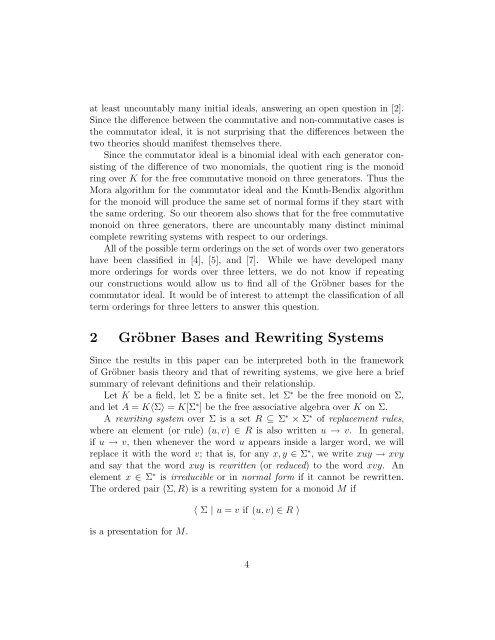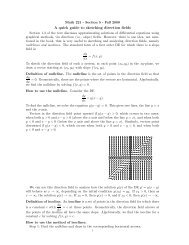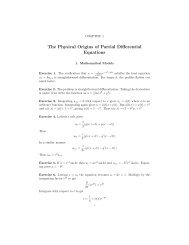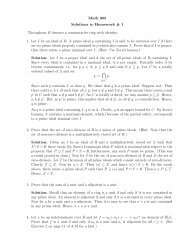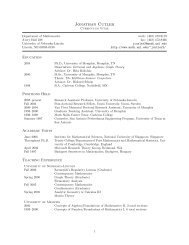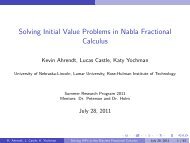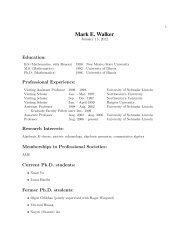Monomial orderings, rewriting systems, and Gröbner bases for the ...
Monomial orderings, rewriting systems, and Gröbner bases for the ...
Monomial orderings, rewriting systems, and Gröbner bases for the ...
Create successful ePaper yourself
Turn your PDF publications into a flip-book with our unique Google optimized e-Paper software.
at least uncountably many initial ideals, answering an open question in [2].<br />
Since <strong>the</strong> difference between <strong>the</strong> commutative <strong>and</strong> non-commutative cases is<br />
<strong>the</strong> commutator ideal, it is not surprising that <strong>the</strong> differences between <strong>the</strong><br />
two <strong>the</strong>ories should manifest <strong>the</strong>mselves <strong>the</strong>re.<br />
Since <strong>the</strong> commutator ideal is a binomial ideal with each generator consisting<br />
of <strong>the</strong> difference of two monomials, <strong>the</strong> quotient ring is <strong>the</strong> monoid<br />
ring over K <strong>for</strong> <strong>the</strong> free commutative monoid on three generators. Thus <strong>the</strong><br />
Mora algorithm <strong>for</strong> <strong>the</strong> commutator ideal <strong>and</strong> <strong>the</strong> Knuth-Bendix algorithm<br />
<strong>for</strong> <strong>the</strong> monoid will produce <strong>the</strong> same set of normal <strong>for</strong>ms if <strong>the</strong>y start with<br />
<strong>the</strong> same ordering. So our <strong>the</strong>orem also shows that <strong>for</strong> <strong>the</strong> free commutative<br />
monoid on three generators, <strong>the</strong>re are uncountably many distinct minimal<br />
complete <strong>rewriting</strong> <strong>systems</strong> with respect to our <strong>orderings</strong>.<br />
All of <strong>the</strong> possible term <strong>orderings</strong> on <strong>the</strong> set of words over two generators<br />
have been classified in [4], [5], <strong>and</strong> [7]. While we have developed many<br />
more <strong>orderings</strong> <strong>for</strong> words over three letters, we do not know if repeating<br />
our constructions would allow us to find all of <strong>the</strong> <strong>Gröbner</strong> <strong>bases</strong> <strong>for</strong> <strong>the</strong><br />
commutator ideal. It would be of interest to attempt <strong>the</strong> classification of all<br />
term <strong>orderings</strong> <strong>for</strong> three letters to answer this question.<br />
2 <strong>Gröbner</strong> Bases <strong>and</strong> Rewriting Systems<br />
Since <strong>the</strong> results in this paper can be interpreted both in <strong>the</strong> framework<br />
of <strong>Gröbner</strong> basis <strong>the</strong>ory <strong>and</strong> that of <strong>rewriting</strong> <strong>systems</strong>, we give here a brief<br />
summary of relevant definitions <strong>and</strong> <strong>the</strong>ir relationship.<br />
Let K be a field, let Σ be a finite set, let Σ ∗ be <strong>the</strong> free monoid on Σ,<br />
<strong>and</strong> let A = K〈Σ〉 = K[Σ ∗ ] be <strong>the</strong> free associative algebra over K on Σ.<br />
A <strong>rewriting</strong> system over Σ is a set R ⊆ Σ ∗ × Σ ∗ of replacement rules,<br />
where an element (or rule) (u, v) ∈ R is also written u → v. In general,<br />
if u → v, <strong>the</strong>n whenever <strong>the</strong> word u appears inside a larger word, we will<br />
replace it with <strong>the</strong> word v; that is, <strong>for</strong> any x, y ∈ Σ ∗ , we write xuy → xvy<br />
<strong>and</strong> say that <strong>the</strong> word xuy is rewritten (or reduced) to <strong>the</strong> word xvy. An<br />
element x ∈ Σ ∗ is irreducible or in normal <strong>for</strong>m if it cannot be rewritten.<br />
The ordered pair (Σ, R) is a <strong>rewriting</strong> system <strong>for</strong> a monoid M if<br />
is a presentation <strong>for</strong> M.<br />
〈 Σ | u = v if (u, v) ∈ R 〉<br />
4


